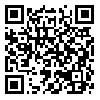BibTeX | RIS | EndNote | Medlars | ProCite | Reference Manager | RefWorks
Send citation to:
URL: http://journal.zums.ac.ir/article-1-206-en.html
Background and Objective: Diabetes mellitus (DM) especially type A, is accompanied by disturbances in learning, memory, and cognitive skills in human society and experimental animals. Regarding the beneficial effect of SM on lipid peroxidation in hyperlipidemia and on serum lipids in DM, this study was conducted to evaluate the effect of prolonged oral administration of SM on learning and memory in diabetic rats.
Materials and Methods: Female wistar rats (n = 36) were randomly divided into control, SM-treated control, diabetic, and SM-treated diabetic groups. Treatment groups received a mixture of SM and standard rat food at a weight ratio of 6.25% for 4 weeks.To induce diabetes, streptozotocin was injected intraperitoneally at a single dose of 60 mg/kg. For evaluation of learning and memory, initial latency (IL) and step-through latency (STL) were determined at the end of the study using passive avoidance test. Meanwhile, alternation behavior percentage was determined using Y maze test.
Results: There was a significant increase (p = 0.032) in IL in diabetic and SM-treated diabetic groups after 4 weeks compared to control group. There was no significant difference between diabetic and SM-treated diabetic groups. On the other hand, STL decreased significantly (p = 0.032) in diabetic group while it increased significantly (p = 0.027) in SM-treated group compared to control group at the end of the study. The results of Y maze showed that alternation score was not different between treated and untreated diabetic groups.
Conclusion: SM could enhance the consolidation and recall capability of stored information but did not affect spatial memory of diabetic animals.
Received: 2008/04/29 | Accepted: 2014/06/29 | Published: 2014/06/29
| Rights and permissions | |
 |
This work is licensed under a Creative Commons Attribution-NonCommercial 4.0 International License. |




